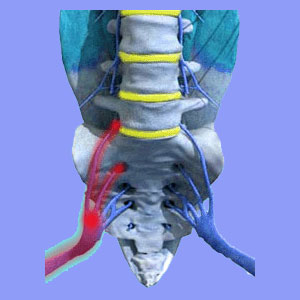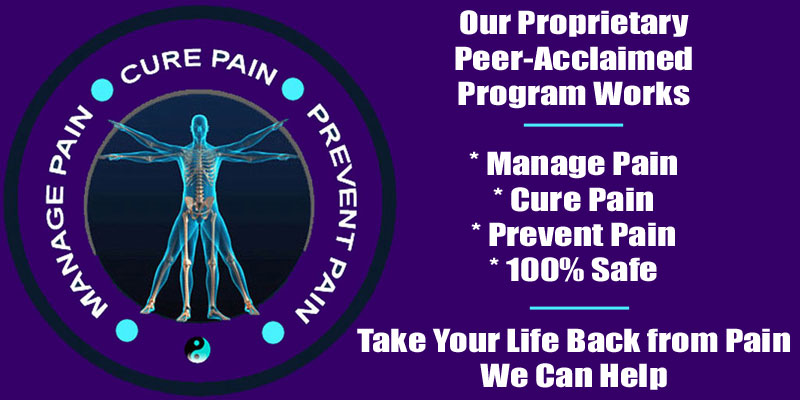
Sciatica from degenerative disc disease is one of the most common diagnoses, since DDD in the lumbar spine is virtually universal among adults. Disc degeneration describes a process by which the intervertebral spacers lose their moisture and their ability to retain moisture. The proper and far less frightening diagnostic term which should be used is disc desiccation. This will certainly help reduce the nocebo effect of the words disc disease.
Sciatica is a greatly misunderstood condition often blamed on a spinal source, such as DDD, but the incidence of misdiagnosis has reached epidemic proportions. Achieving an accurate diagnosis is vital if a patient is to have any real hope of finding a lasting cure.
This essay will examine how disc degeneration might lead to decreased foraminal openings and subsequent sciatic nerve expressions.
Sciatica from Degenerative Disc Disease Facts
Degenerative disc disease is rarely more than a scapegoat used to explain sciatica and general lower back pain. It is normal and expected for the lumbar discs to lose height and mass, especially at L4/L5 and L5/S1. Bulges and herniations due to degeneration are also very common in the lower lumbar intervertebral discs. These conditions are generally not symptomatic, but are almost always available to explain otherwise idiopathic sciatica symptoms.
It is possible for extreme disc degeneration to enact pain and related neurological symptoms, but this occurs in only a small fraction of all people diagnosed with DDD. In these instances, it is usually the combination of extreme disc desiccation and osteoarthritic buildup which narrows the foraminal spaces almost completely.
Since the spinal nerves do not have adequate room to exit the central canal, some may become compressed and cause the sciatica symptoms. However, it is still absolutely vital to seek neurological correlation, since in a great number of cases, the symptoms do not exactly match up to the affected nerve level, despite considerable foraminal stenotic change existing coincidentally.
Sciatica from DDD Treatment
Therapy options for sciatica suspected to be related to disc degeneration generally fall into the symptomatic treatment category. These medical modalities will do nothing to resolve the underlying source of the pain, assuming of course that DDD is actually responsible, but instead only help to manage the expressions.
Symptomatic treatment is a form of slavery and is designed to keep the patient in long lasting and highly profitable care for years, or even for life. The 2 medical exceptions to the rule of symptomatic treatment include sciatica surgery and spinal decompression.
Surgery for sciatica from degenerative disc disease is a risky proposition for and may cause more harm than good. Curative results for surgical interventions are quite poor and many operated individuals wind up far worse after their procedure. This is the nightmare called failed sciatica surgery syndrome.
Spinal decompression is a non-surgical solution for some forms of disc degeneration. Noninvasive decompression is typically a better bet for patients who buy into the structural explanation for their pain, whether it is correct or not. There is just far less risk and undergoing decompression does not disqualify any patient from trying a surgical choice later, if the treatment fails to provide relief.
Sciatica from Degenerative Disc Disease Guidance
Remember the horrible feeling you had when your doctor told you that you had degenerative disc disease in your spine? It was so scary sounding and you wondered what you would do now. I will bet that the doctor sure did not wait long to begin to tell you about the many treatment options. Sound familiar? Yeah, for me, as well.
Luckily, after suffering from sciatica and lower back pain for decades, I eventually became familiar with the true facts about sciatica and degenerative disc disease, in particular. I used this knowledge to repudiate the built up fears which consumed me, concerning my future health and failing spine. I no longer waste time and money blaming it on innocent and coincidental conditions, such as my lumbar disc degeneration.
I typically advise patients to speak to an orthopedist about degenerative disc disease. However, be forewarned that a great number of doctors will unfairly vilify the condition just to make some easy money. Sure, listen to what your doctor has to say, but before undergoing any treatment, I recommend the following additional steps:
First, get a few additional opinions from different types of doctors. Next and more importantly, do lots of independent research for yourself. I am quite sure that you will discover that disc degeneration is not what it is often made out to be, simply for the sake of profit.
The sites of The Cure Back Pain Network offer a tremendous number of objective articles covering sciatica from degenerative disc disease. Simply use the search bar in the right column to find all of them and enjoy reading.
Sciatica > Sciatica Causes > Sciatica from Degenerative Disc Disease





